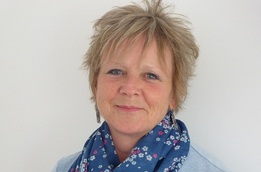'Nobody can know what it is like to live with young onset dementia. It is bloody awful'
Young onset dementia has always had very little publicity compared to the high-profile exposure that dementia gets.

However this is gradually starting to change and the recent news that AC/DC guitarist Malcolm is suffering from young onset dementia at the age of 61 and is now living in a care home in Australia, has put the condition under the spotlight.
The Scottish-born rocker, who formed the band with this brother Angus back in 1973, can no longer remember how to play any AC/DC songs and is reported to have completely lost his short-term memory.
Young onset dementia refers to people of working age usually between 30 and 65 years old and lack of awareness of the condition means doctors often confuse the symptoms with that of stress or depression. This leads to late diagnosis for many with young onset dementia.
When they are eventually diagnosed, the challenges are very different than for older people with dementia.
Rikki Lorenti, the UK’s first Young Onset Dementia Admiral Nurse, says: “You have a person in their 40s, with a family, a job and they have regular BBQs and go on holiday and then they are told they have dementia.
“They start asking lots of questions like how will I manage financially, socially, emotionally and practically and how will their families manage.”
'My granddaughter came to visit and I didn't know her name'
Sandy revealed how she started young onset dementia not knowing she had it.
Speaking at the first national young onset dementia conference A Life Worth Living, she said: “The most dangerous thing I did was pouring bleach in the bath. I was coping okay then one day I went shopping and I stood outside a shop and I didn’t know where I was. I don’t know how I got home but I did eventually.”
For her “the crunch came when my granddaughter came to visit and I didn’t know her name. I looked at this child and I knew I loved her but I didn’t know her name.
“My depression got worse and worse. I used to think what was the point of a diagnosis as you can’t do anything about it. But it does help as you can get support and family and friends understand why you are being like you are. Nobody can know what it is like to have dementia. It is bloody awful.”
Sarah, who is the wife and carer of Alan, believes it would help if there was earlier diagnosis and early intervention for people with young onset dementia. She would also like to see employers being more young onset dementia friendly as losing their job when diagnosed can often take away their purpose for living.
“We need to keep people in their place of work as long as possible. Luckily he was given another job by BT which I describe as quite repetitive but it is good for him. Alan wants to continue to be a person and do the things that are meaningful to him.”
Urgent need for more support and respite care services
Jenny would like to see more support forthcoming from the NHS.
Her husband was diagnosed with young onset dementia in Autumn 2010. “This was when our lives changed,” she says. “Doctors diagnosed my husband Dave with young onset dementia. He started to have difficulty with writing and reading. He was an engineer. The diagnosis was such a shock. At first I thought the doctors had made a mistake, my Dave is still my Dave. He sounded the same and looked the same. We left the hospital in a daze. We were told he was not allowed to drive and was put on long-term sick. He never went back to his job again. With no support offered from the NHS, we were left very much alone. Even though we did have fantastic family and friends.
“Doctors were unable to tell us what path Dave’s dementia would take as everyone is different. I spent a lot of time on the internet looking at research programmes hoping there was an answer but there seemed to be nothing.”
She reveals how it “took courage to look for help”.
“Luckily the charity YoungDementia UK came to our rescue. A family support worker came to visit us at home and I was given power of attorney.
“From this year, Dave can no longer communicate. To see your loved one unable to answer questions is so awful.
“He used to go cycling with a one to one support worker but he can no longer do this anymore.
“The support worker gives me a break from what is a heavy burden. Now Dave is doubly incontinent, leaving him at home with friends is no longer an option.”

Another problem is the lack of respite facilities to give carers of people with young onset dementia that much needed break. Jenny testifies how difficult this can be. “I have only found one care home with a respite bed but it is fully booked and you have to book it six months in advance,” she says.
Tessa Gutteridge, director of YoungDementia UK says: “Most people with young onset dementia don’t get the support they need. Part of the problem is that it is a scattered population. Because of this, we are missing a strong, collective voice and we don’t have a visible, national entity.”
YoungDementia UK helps prevent isolation
The charity YoungDementia UK has been vital in making her realise she is not alone.
“Being alongside others who really understand what I am going through really helps. I do go to the YoungDementia UK Walk and Talk groups which make you realise you are not alone.”
Another important support service is the Forget Me Not Centre run by the Avon & Wiltshire NHS Trust. This offers therapeutic daytime support for people with young onset dementia helping them reclaim their former productive and enjoyable lives and offering ways of managing their symptoms.
Sandy attends Forget Me Not and describes herself being like a new person since going there. “I do so much at Forget Me Not. We treat it like a home and we do painting and we go on barge trips.”
Lynda Hughes, manager of the centre says: “You can’t change the condition but we can change the environment, the occupation and the experience.”
Over 40,000 people get dementia before the age of 65 and a new report by the Alzheimer’s Society revealed that the number of people with young onset dementia is expected to rise to 50,000 by 2051.
This is why it is doubly important that more support and specialist care services are offered to people with young onset dementia, so life doesn’t just stop when someone is diagnosed with the condition.
Latest Features News
 25-Nov-19
2019 Election: Boris Johnson leaves social care in 'too difficult box' but Labour vows to end 'crisis'
25-Nov-19
2019 Election: Boris Johnson leaves social care in 'too difficult box' but Labour vows to end 'crisis'
 18-Oct-19
Podcast: Wendy Mitchell and dementia: 'My biggest fear is not knowing who my daughters are'
18-Oct-19
Podcast: Wendy Mitchell and dementia: 'My biggest fear is not knowing who my daughters are'
 27-Sep-19
Exclusive: Care minister backs care workers' call for time off to grieve and attend funerals
27-Sep-19
Exclusive: Care minister backs care workers' call for time off to grieve and attend funerals
 19-Sep-19
Podcast: Gyles Brandreth says poetry helps ward off dementia
19-Sep-19
Podcast: Gyles Brandreth says poetry helps ward off dementia
 30-Aug-19
Edinburgh Fringe funnyman joins comics facing toughest audience at care home gig
30-Aug-19
Edinburgh Fringe funnyman joins comics facing toughest audience at care home gig